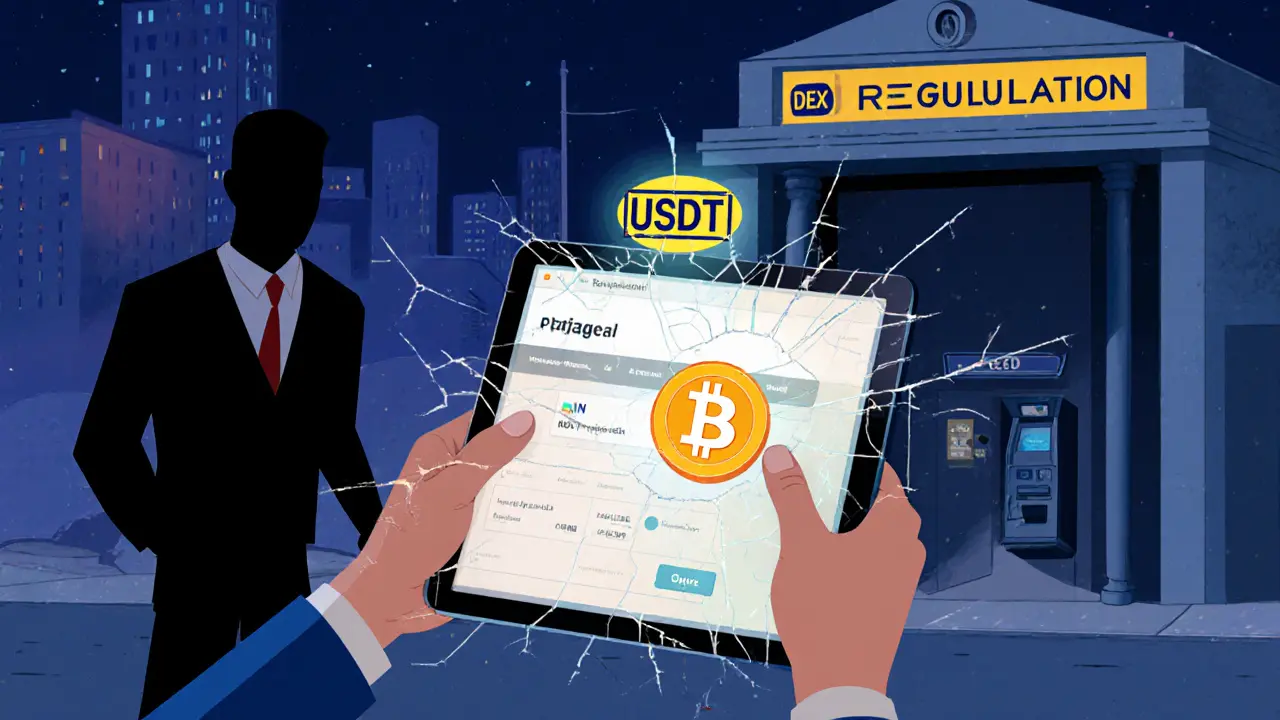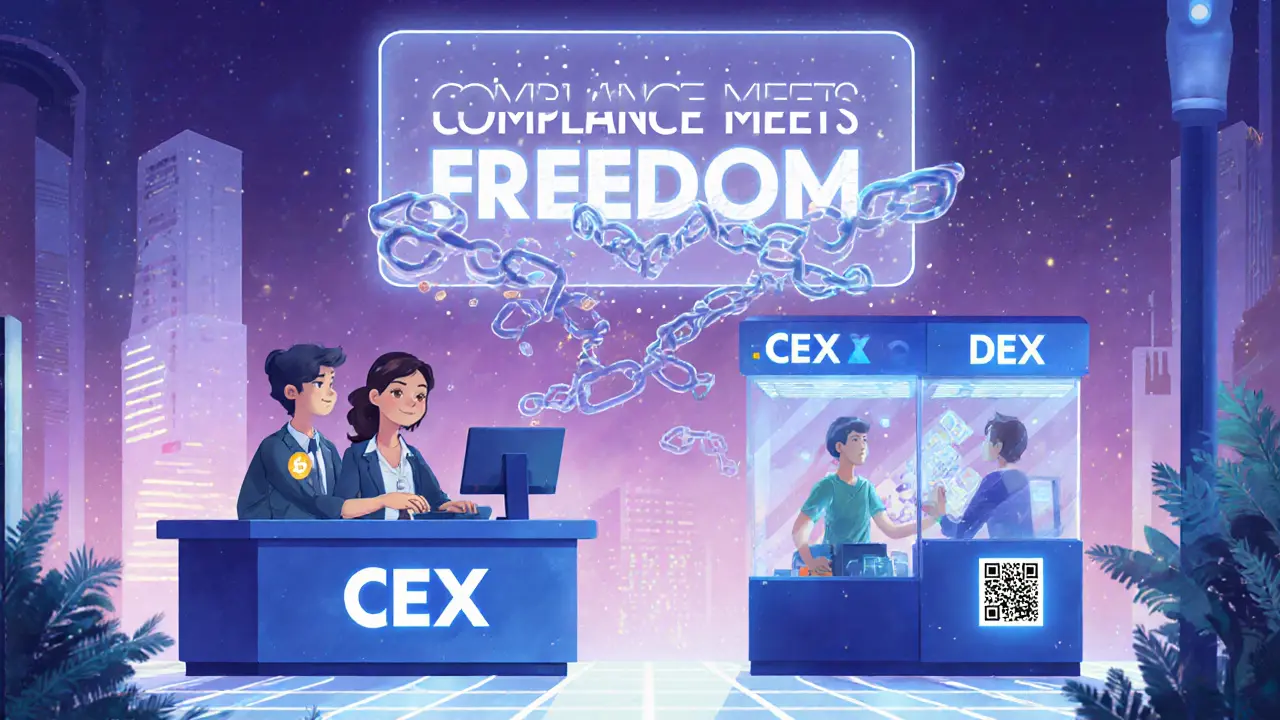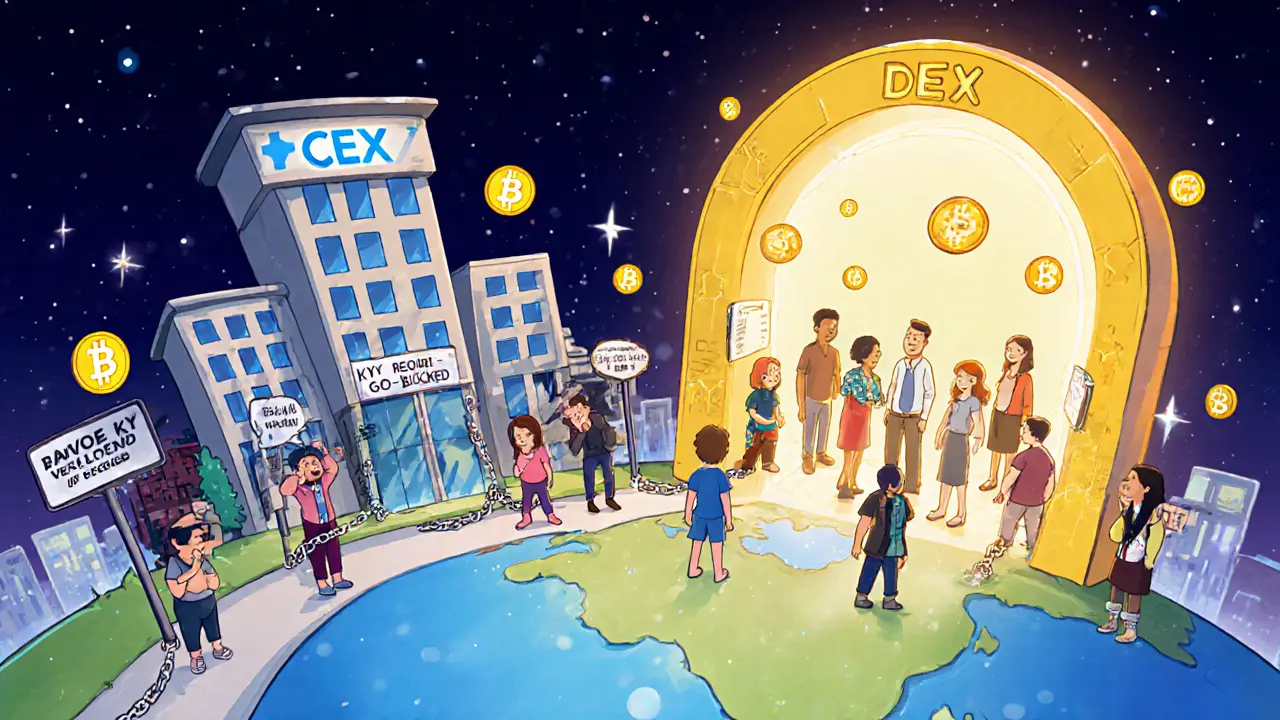Geographic Crypto Access Checker
Where Can You Trade Crypto?
Enter your country to see which crypto exchanges work for you based on regulatory restrictions.
Centralized Exchanges (CEX)
Decentralized Exchanges (DEX)
Important Note
Even if you can access DEXs, local laws may still require you to report trades and pay taxes. Using VPNs to bypass restrictions may result in account freezes or legal issues.
If you’ve ever tried to buy Bitcoin from a different country and got blocked, you know how messy crypto access can be. It’s not about whether you have the money-it’s about where you live. Two types of exchanges dominate the market: centralized exchanges (CEX) and decentralized exchanges (DEX). But when it comes to who can trade and where, they’re worlds apart.
Why CEXs Block Users Based on Location
Centralized exchanges like Binance, Coinbase, and Kraken act like banks. They hold your money, verify your identity, and answer to governments. That’s why they can’t just let anyone from anywhere trade. If you’re in the U.S., you can’t trade derivatives on Binance.US. If you’re in Russia, you might be blocked from using Coinbase entirely. If you’re in Nigeria, some CEXs restrict your withdrawal limits. These aren’t random rules-they’re legal requirements. Each country has its own financial watchdogs, and CEXs have to get licenses to operate there. No license? No access. These platforms use your IP address, phone number, ID documents, and even bank details to figure out where you are. If you try to bypass it with a VPN, you risk getting your account frozen. One user in Canada told me he lost $12,000 after using a VPN to access a U.S.-only CEX. The exchange flagged his account as suspicious, froze everything, and took months to respond. The result? A patchwork of access. You might be able to trade ETH on one exchange in Germany but not in Brazil. You can deposit euros in France but not in Argentina. It’s not about technology-it’s about paperwork.How DEXs Bypass Geographic Blocks
Now, compare that to Uniswap, PancakeSwap, or SushiSwap. You don’t sign up. You don’t upload a passport. You just connect your wallet-MetaMask, Phantom, or Trust Wallet-and start trading. No one asks where you live. That’s because DEXs run on smart contracts. These are self-executing programs on blockchains like Ethereum or Solana. There’s no company behind them. No CEO. No headquarters. No license to renew. So technically, no government can shut them down. A trader in Venezuela uses DEXs to convert Bitcoin to USDT because local banks won’t touch crypto. A student in India swaps tokens to avoid capital controls. A freelancer in Nigeria buys stablecoins to pay for web hosting without waiting weeks for PayPal clearance. All of them are using DEXs because they’re the only option. You don’t need a bank account. You don’t need to prove your income. You just need internet and some crypto to start. That’s why DEXs are the go-to for people in countries with strict financial controls.The Fiat Problem: Why DEXs Aren’t Always Easier
But here’s the catch: DEXs don’t accept dollars, euros, or pesos. You need crypto first. So if you’re in a country where buying crypto is hard, DEXs don’t help much. In places like Argentina or Turkey, you can buy Bitcoin through peer-to-peer platforms like LocalBitcoins or Paxful. But in countries like Egypt or Vietnam, even that’s risky. Local banks flag transactions. Payment apps shut down accounts. People end up paying cash to strangers in parking lots just to get crypto. CEXs solve this with direct bank transfers. You link your account, deposit $500, and buy ETH in minutes. But only if you’re in a supported country. In Nigeria, Binance lets you deposit via bank transfer. In South Africa, you can use PayFast. In Indonesia? You’re stuck with OTC desks or third-party brokers. So DEXs are open-but you need to get in first. And that’s the bottleneck.
Regulators Are Catching Up
For years, DEXs flew under the radar. Regulators focused on CEXs because they were easier to target. But that’s changing. In 2024, the EU’s MiCA regulation started requiring DEXs that act as service providers to implement basic KYC. The U.S. SEC has started targeting DEX liquidity providers, saying they’re unregistered brokers. South Korea and Japan are pushing for geofencing on DEX interfaces. Some DEXs are already adapting. Uniswap now shows a warning to users in the U.S. saying “Trading may be restricted in your jurisdiction.” PancakeSwap has started blocking IPs from sanctioned countries. Even though the code runs on-chain, the front-end websites can be restricted. This is the new frontier. DEXs were built to be free from borders-but now, the borders are coming to them. Not through the blockchain, but through the websites, apps, and wallets people use to access them.Security vs Control: Who Really Owns Your Crypto?
CEXs promise convenience. They store your crypto in cold wallets. They have insurance. They let you reset passwords. If you lose your phone, they can help. But they also control everything. If they decide you’re a risk, they freeze your funds. If they get hacked, you lose everything-even if you didn’t do anything wrong. In 2022, FTX collapsed and over 8 million users lost access to their funds. The company had licenses, KYC, and compliance-but still failed. DEXs put control in your hands. You hold your own keys. No one can freeze your wallet. No one can reverse your trade. But if you lose your seed phrase? Gone forever. If you send crypto to the wrong address? No help coming. And here’s the twist: even if you’re using a DEX, you’re still bound by local laws. In the U.S., you still have to report crypto gains. In Germany, you still pay capital gains tax. The DEX doesn’t care-but the tax office does.
What This Means for Everyday Traders
If you live in the U.S., Canada, Australia, or the EU: CEXs are easier. You can deposit fiat, trade quickly, and get customer support. But you’re locked into their rules. If you live in Nigeria, Venezuela, Iran, or Russia: DEXs are your lifeline. You can’t rely on banks. You can’t trust local exchanges. You need privacy and access. But you’ll need to learn how to manage your own security. If you’re in a middle-ground country like Brazil, India, or Indonesia: You might use both. Buy crypto on a CEX with local payment methods, then move it to a DEX for better rates or to avoid restrictions. There’s no universal answer. It depends on where you are, what you’re trying to do, and how much risk you’re willing to take.What’s Next? The Rise of Hybrid Solutions
Some new platforms are trying to bridge the gap. LayerZero and Chainlink are building cross-chain bridges that let users swap tokens across regions without a central middleman. Others are creating compliant DEXs that use geo-blocking on the front-end but keep trades on-chain. A startup in Singapore launched a DEX that only lets users from ASEAN countries trade. It uses IP checks and wallet history to verify location. It’s not fully decentralized anymore-but it’s more accessible than a CEX. The future might not be CEX vs DEX. It might be CEX + DEX + compliance tools. The goal isn’t to eliminate restrictions-it’s to make them smarter.Can I use a DEX if my country bans crypto?
Technically, yes. DEXs don’t require you to register or prove your identity, so they’re harder to block than centralized exchanges. But if your country bans crypto outright, using a DEX could still put you at legal risk. Even if the platform doesn’t know who you are, your internet activity can be tracked. Always check local laws before trading.
Why can’t DEXs just block users by country like CEXs do?
The core code of a DEX runs on a blockchain, which is public and distributed. No single entity controls it, so they can’t easily block IPs or users. However, the websites and apps you use to access DEXs (like Uniswap’s interface) are hosted on servers and can be restricted. So while the trade itself can’t be stopped, your access to the interface can be.
Do I need to pay taxes on DEX trades?
Yes. Just because a DEX doesn’t report your trades doesn’t mean you’re off the hook. In most countries, every crypto trade-whether on a CEX or DEX-is a taxable event. You’re responsible for tracking your gains and losses. Many users use tools like Koinly or CoinTracker to calculate taxes from wallet addresses.
Is it safer to use a CEX or a DEX?
It depends. CEXs offer insurance and customer support, but they’re centralized targets for hacks and government seizures. DEXs give you full control, but if you lose your private key or fall for a scam, there’s no recovery. For beginners, a regulated CEX is often safer. For experienced users who understand wallet security, DEXs offer more freedom.
Can I use a VPN to access a restricted CEX?
You can, but it’s risky. Most major CEXs actively detect and ban VPN users. If caught, your account may be frozen, funds withheld, or even reported to authorities. Some users have lost months of access or faced legal notices. It’s not worth the risk unless you fully understand the consequences.




22 Comments
Louise Watson
Access isn't freedom if it's gated by geography.
Benjamin Jackson
I’ve used both CEX and DEX across three countries. The real win with DEX isn’t anonymity-it’s resilience. When your bank suddenly decides crypto is ‘too risky,’ you don’t panic. You just open your wallet and keep going. No calls. No forms. No waiting.
Liam Workman
It’s wild how DEXs turned into the underground railroad of finance. 🌍💸 People in Venezuela aren’t trading for profit-they’re trading to eat. And yeah, the front-end blocks are creeping in, but the chain? Still free. That’s the magic. You can’t censor math.
Even if Uniswap adds a pop-up saying ‘You’re not allowed,’ the smart contract doesn’t care. It still executes. The real battle isn’t on the blockchain-it’s in the app stores and browser extensions.
I’ve watched friends in Nigeria use DEXs to pay their kids’ school fees when PayPal froze their account. No one’s sending them a check. They’re swapping USDT for Naira on a phone in a Lagos café. That’s not finance. That’s survival.
And yes, you need crypto to start. But peer-to-peer is growing. LocalBitcoins isn’t perfect, but it’s alive. People are bartering crypto like cigarettes in a blockade.
The next frontier? Wallets that auto-detect your region and suggest compliant bridges. Not to lock you out-to help you navigate.
CEXs are banks with better UX. DEXs are the wild west with a ledger. We don’t need one to replace the other. We need both to evolve.
And if regulators start forcing KYC on DEX interfaces? Fine. But let them try to force KYC on a transaction. That’s when the real chaos begins.
Blockchain isn’t about trust. It’s about verification. And that’s why it outlasts every government that tries to control it.
Keep your keys. Keep your head. And keep trading.
Robin Hilton
Why do people even bother with DEXs when they can just use Coinbase? If you're in the U.S., you have access to the best, most secure, regulated platform on Earth. Why risk losing everything because you want to ‘feel free’? It’s not rebellion-it’s stupidity.
And don’t give me that ‘but in Nigeria’ nonsense. If your country can’t even regulate crypto properly, maybe you shouldn’t be trading at all. Get your house in order first.
Grace Huegel
It’s fascinating how the ‘decentralized’ narrative collapses under the weight of human behavior. Everyone wants freedom… until they need customer service. Then they’re screaming for a refund email.
And let’s be honest-most people using DEXs don’t understand smart contracts. They’re just using MetaMask because they saw it on TikTok.
Scot Henry
Biggest myth: ‘DEXs are unregulated.’ They’re not. They’re just regulated by the blockchain itself. Every trade is public. Every wallet is traceable. Governments don’t need to shut down DEXs-they just need to track the wallets.
I’ve seen IRS subpoenas for DEX users. They don’t care if you used Uniswap or Binance. They care about your tax form.
Also, if you’re using a VPN to bypass CEX restrictions? You’re not a crypto rebel. You’re a liability.
Sunidhi Arakere
In India, we use both. Buy on CoinSwitch, move to Uniswap for better rates. Simple. No drama. Just smart.
Vivian Efthimiopoulou
Let’s clarify a critical misconception: DEXs are not inherently ‘free from borders.’ They are free from centralized control-but not from the legal, economic, and infrastructural borders that constrain human access. The blockchain is global. The user is not.
The real innovation isn’t the smart contract. It’s the wallet. The wallet is the new passport. And just like passports, wallets will soon carry digital compliance stamps-KYC on-chain, reputation scores, jurisdiction flags embedded in the metadata.
This isn’t the end of decentralization. It’s its maturation. We’re moving from ‘trustless’ to ‘trust-verified.’
And yes-taxes still apply. Always. The ledger doesn’t lie. The IRS doesn’t sleep.
The future isn’t CEX vs DEX. It’s regulated liquidity pools, jurisdiction-aware wallets, and self-sovereign identity layered on-chain. The tools are already being built. The question is: Will we use them wisely?
Angie Martin-Schwarze
i just lost 3k on a dex bc i sent to the wront addy and no one helpd me 😭
why do people say dex is better???
Fred Kärblane
Let’s talk liquidity fragmentation. CEXs have order books. DEXs have AMMs. The latter creates slippage, especially on low-cap tokens. But here’s the kicker: DEXs enable permissionless token creation. That’s the real power. A developer in Jakarta can launch a token and reach global liquidity without a single bank account. That’s innovation. That’s disruption.
And yes, the front-end geo-blocks are creeping in-but the on-chain liquidity? Still open. That’s the loophole regulators can’t close.
Janna Preston
Wait-if DEXs are so open, why can’t I use them in Iran? I’ve tried. My MetaMask connects, but the interface says ‘Not available in your region.’ So what’s ‘decentralized’ about that?
Is it just the website? Or is the whole system becoming centralized again?
Pranjali Dattatraya Upadhye
My cousin in Mumbai uses DEXs to send money to her sister in Dubai-no bank, no fees, no waiting. She buys USDT on a P2P app, swaps on PancakeSwap, and her sister cashes out via a local crypto ATM. It’s faster than Western Union. And cheaper. And no one’s asking for a birth certificate.
That’s not ‘hacking the system.’ That’s just… using tech the way it was meant to be used.
CEXs are like postal services. DEXs are like texting. One needs paperwork. The other just needs a signal.
Kyung-Ran Koh
For those who think DEXs are ‘free’-remember: freedom isn’t the absence of rules. It’s the right to choose them.
CEXs force you to accept their rules. DEXs let you accept-or ignore-the rules of the chain.
And yes, you’re still responsible for taxes. But at least you’re not giving your data to a company that sells it to advertisers.
That’s the real trade-off: convenience vs. autonomy.
Missy Simpson
Just wanna say… DEXs saved my mom’s small business during inflation 😭 She buys USDT every week now. No bank holds her money anymore. It’s not about crypto hype-it’s about survival. 💪❤️
Tara R
People romanticize DEXs like they’re some libertarian utopia. The truth? Most users are clueless. They lose funds. They get scammed. They think ‘no KYC’ means ‘no consequences.’ It doesn’t. Your tax bill doesn’t care if you used Uniswap or Coinbase.
And if you’re using a VPN? You’re not brave. You’re just reckless.
Matthew Gonzalez
My friend in Venezuela trades DEXs every day. He doesn’t care about ‘decentralization.’ He cares that his kids eat. That’s the real story. Not the tech. Not the regulation. Just a dad trying to feed his family.
That’s why we need DEXs. Not because they’re cool. Because they’re necessary.
Michelle Stockman
So you’re telling me the ‘revolution’ is… using a website that blocks you if you’re American?
Wow. Groundbreaking.
Brian Webb
I live in Canada. I use Coinbase for fiat on-ramps. Then I move everything to a DEX for swaps. Why? Because the fees are lower and I don’t trust a company to hold my keys.
It’s not an either/or. It’s a stack.
CEXs are the door. DEXs are the house.
Leo Lanham
DEXs are the only reason I haven’t moved to Uruguay. If I couldn’t swap crypto without a passport, I’d be stuck in this snow-filled hellhole forever.
Thanks, blockchain. You’re the only thing keeping me sane.
Whitney Fleras
For anyone new to this: start with a CEX to buy your first crypto. Then move it to your own wallet. Then use a DEX. Learn one step at a time. No need to jump into the deep end.
You don’t have to be a hacker to be free.
Finn McGinty
Let’s not pretend this is a battle between freedom and control. It’s a battle between bureaucracy and entropy. CEXs are institutions trying to survive regulation. DEXs are chaos trying to survive bureaucracy.
The winner? Neither. The real victor is the user who learns to navigate both.
And if you’re still using a VPN to access a CEX? You’re not a pioneer. You’re a liability to yourself and everyone else on the network.
Stop playing games. Learn the system. Or get out.
Liam Workman
And to the person who lost $12k on a VPN: you weren’t trying to outsmart the system-you were trying to outsmart gravity. CEXs have legal teams, forensic trackers, and AI that flags VPNs faster than you can click ‘connect.’
That’s not a ‘risk.’ That’s a consequence.
But here’s the real lesson: if you’re using a CEX, you’re already trusting someone else with your money. The VPN was just the final act of delusion.